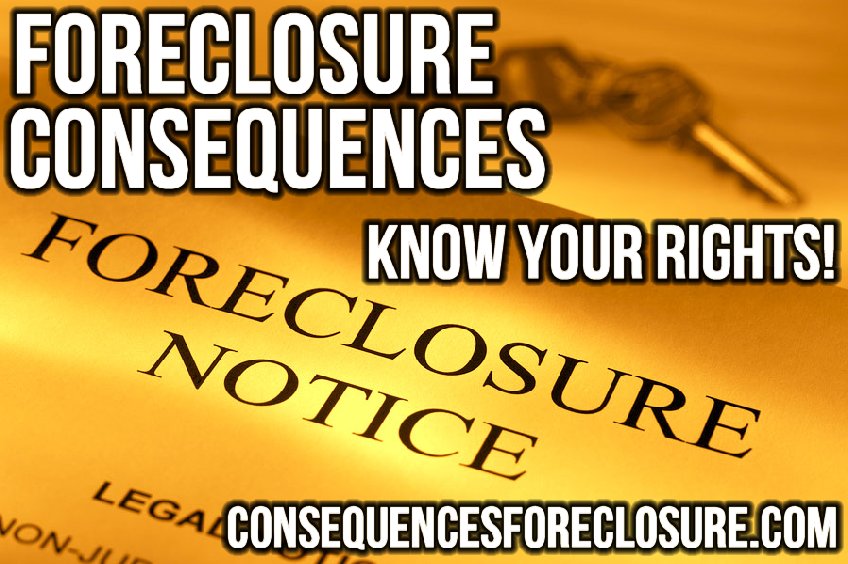 Foreclosure Consequences - Consequences of Foreclosure
Foreclosure Consequences - Consequences of Foreclosure
Foreclosure Consequences in Tennessee - TN

Foreclosure Summary copyright, © ForeclosureLaw.org
Quick Facts
Judicial Foreclosure Available: Yes
Non-Judicial Foreclosure Available: Yes
Primary Security Instruments: Deed of Trust, Mortgage
Timeline: Typically 60 days
Right of Redemption: Yes
Deficiency Judgments Allowed: Yes
In Tennessee, lenders may foreclose on deeds of trusts or mortgages in default using either a judicial or non-judicial foreclosure process.
Judicial Foreclosure
The judicial foreclosure process is one in which the lender must file a complaint against the borrower and obtain a decree of sale from a court having jurisdiction in the county where the property is located before foreclosure proceedings can begin. Generally, if the court finds the borrower in default, they will give them a set period of time to pay the delinquent amount, plus costs. If the borrower does not pay within the set period of time, the court will then order the property to be sold.
Non-Judicial Foreclosure
The non-judicial process of foreclosure is used when a power of sale clause exists in a mortgage or deed of trust. A "power of sale" clause is the clause in a deed of trust or mortgage, in which the borrower pre-authorizes the sale of property to pay off the balance on a loan in the event of the their default. In deeds of trust or mortgages where a power of sale exists, the power given to the lender to sell the property may be executed by the lender or their representative, typically referred to as the trustee. Regulations for this type of foreclosure process are outlined below in the "Power of Sale Foreclosure Guidelines".
Power of Sale Foreclosure Guidelines
If the deed of trust or mortgage contains a power of sale clause and specifies the time, place and terms of sale, then the specified procedure must be followed. Otherwise, the non-judicial power of sale foreclosure is carried out as follows:
- A notice of sale must be published at least three (3) different times in a newspaper published in the county where the sale is to be made, with the first publication appearing at least twenty (20) days prior to the sale.
- Unless otherwise ordered, if no newspaper is published in said county, the notice of sale must be posted at least thirty (30) days in advance of the sale in at least five (5) public places within the county. At least one of these notices must be placed at the courthouse door and another in the neighborhood of the property itself.
- A notice of sale must also be served upon the borrower at least twenty (20) days prior to the date of sale if the borrower is in possession of the property.
- The sale must be held between the hours of 10:00 am and 4:00 pm for cash to the highest bidder. The sheriff of each county in the state of Tennessee may set a minimum acceptable price for the property as long as the price is equal to or greater than fifty percent (50%) of the fair market value.
- The successful bidder at the foreclosure sale will receive a certificate of sale and may be entitled to receive a deed once the borrowers right of redemption has expired.
Deficiency judgments are allowed in Tennessee and the borrower has a period of two (2) years to redeem the property, unless their right of redemption was waived in the original deed of trust.
More information on Tennessee foreclosure laws
Learn all about foreclosure consequences in Alabama: AL, foreclosure consequences in Alaska: AK, foreclosure consequences in Arizona: AZ, foreclosure consequences in Arkansas: AR, foreclosure consequences in California: CA, foreclosure consequences in Colorado: CO, foreclosure consequences in Connecticut: CT, foreclosure consequences in Delaware: DE, foreclosure consequences in Florida: FL, foreclosure consequences in Georgia: GA, foreclosure consequences in Hawaii: HI, foreclosure consequences in Idaho: ID, foreclosure consequences in Illinois: IL, foreclosure consequences in Indiana: IN, foreclosure consequences in Iowa: IA, foreclosure consequences in Kansas: KS, foreclosure consequences in Kentucky: KY, foreclosure consequences in Louisiana: LA, foreclosure consequences in Maine: ME, foreclosure consequences in Maryland: MD, foreclosure consequences in Massachusetts: MA, foreclosure consequences in Michigan: MI, foreclosure consequences in Minnesota: MN, foreclosure consequences in Mississippi: MS, foreclosure consequences in Missouri: MO, foreclosure consequences in Montana: MT, foreclosure consequences in Nebraska: NE, foreclosure consequences in Nevada: NV, foreclosure consequences in New Hampshire: NH, foreclosure consequences in New Jersey: NJ, foreclosure consequences in New Mexico: NM, foreclosure consequences in New York: NY, foreclosure consequences in North Carolina: NC, foreclosure consequences in North Dakota: ND, foreclosure consequences in Ohio: OH, foreclosure consequences in Oklahoma: OK, foreclosure consequences in Oregon: OR, foreclosure consequences in Pennsylvania: PA, foreclosure consequences in Rhode Island: RI, foreclosure consequences in South Carolina: SC, foreclosure consequences in South Dakota: SD, foreclosure consequences in Tennessee: TN, foreclosure consequences in Texas: TX, foreclosure consequences in Utah: UT, foreclosure consequences in Vermont: VT, foreclosure consequences in Virginia: VA, foreclosure consequences in Washington: WA, foreclosure consequences in Washington, DC; foreclosure consequences in West Virginia: WV, foreclosure consequences in Wisconsin: WI, foreclosure consequences in Wyoming: WY